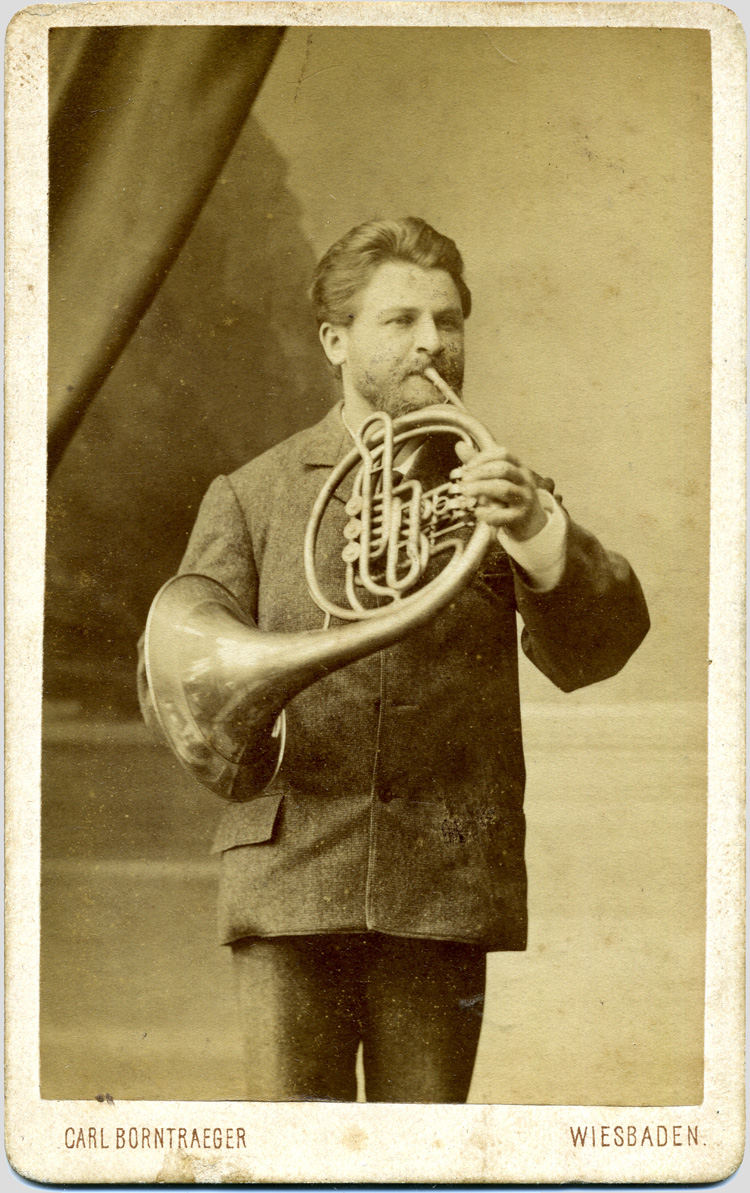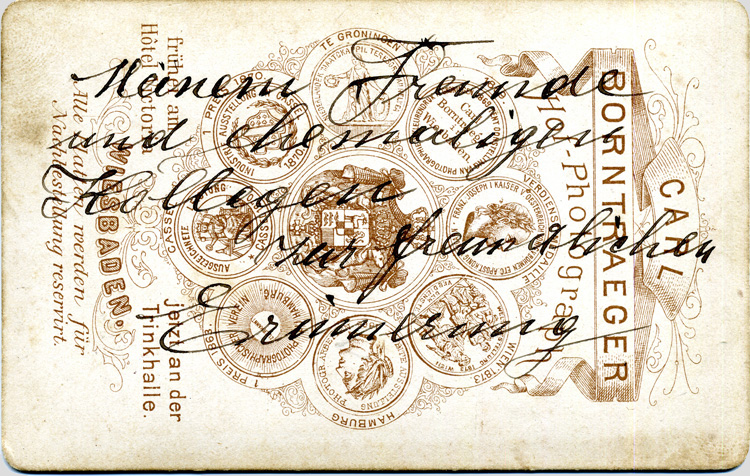
|
The handsome but unidentified horn player
shown in the carte de visite above was probably
prominent in Wiesbaden, Germany in the late nineteenth
to early twentieth century. The photograph dates
from after 1873 based on the awards listed by the
photographer, Carl Borntraeger, in the backstamp
(below). Later examples from the Borntraeger studio do
not show any further awards that would put an upper
bound on the date of this photo. The horn is
characteristic of a Vienna
type but with rotary valves instead of the usual
Vienna "pumpen" valves. It was probably made in the
workshop of Leopold Uhlmann, Vienna.
|

The inscription written on the back
of the CDV is of no help in identifying the player: Meinem
Freunde und ehemaliger Kollegen mit freundlichen
Erinnerung [To my
friends and former colleagues with kind memories].
|
There were numerous horn
players performing in Wiesbaden during the latter part
of the nineteenth century:
|
Königlich Kammermusiker
Paul Eschenbach was born December 19, 1850 in
Markneukirchen to Franz Imanuel and Sophie Eschenbach.
He married Clara Kumpf, daughter of Georg and Lucie,
with whom he had three children, Sophia Friedericke
Eschenbach (1881 - ), Franziska Julie Eschenbach (1883 -
), and Paula Eschenbach (ca. 1886 - 1887). Clara died on
October 21, 1896. Two years later he married
Elizabeth Eleanore Leonie Christine Schweitzer
with whom he had a daughter, Clara Eschenbach. In 1894
he is listed second in the Koniglich
Theater-Orchester after Louis Scharr.
Paul Eschenbach died October 24, 1925 in Wiesbaden,
Germany.
|
Königlich
Kammermusiker Heinrich Günther was born
September 3, 1869.
|
Königlich Kammermusiker
Karl Friedrich Emil Louis Scharr was born August 19,
1858, a son of August Heinrich and Marie Sophie
Christiane Scharr. He studied horn at the Grossherzoglichen
Musikschule in Munich with Julius Wissler1
to whom he later dedicated his
Fantasie
for Horn and Piano or Organ "Erinnerungen an Weimar”
Op. 6. While in Munich he performed a wind
quintet by Onslow (Nov. 19, 1876) and Romance
for Horn by Franz Strauss (Feb. 18, 1877) orchestrated
by J. Wissler, On July 9, 1887 he married
Marie Therese Luise Stommel in Wiesbaden, Hesse
Germany. He was solo horn of the Königlischen
Theater-Orchester, Wiesbaden and was selected for the
prestigious Bayreuth Festival
in 1891, 1892, 1894, and 1896.2 In addition to the Fantasie Herr
Scharr composed several other pieces for horn
including his Romanze für Waldhorn mit
Clavierbegleitung, Op. 21, (1887), and Andante
and Allegro for Horn, Op. 22, no. 2,, the latter
dedicated to his Bayreuth colleague from Munich, Bruno
Hoyer. It is quite probable that he is the person in
the photo on this page and wrote the dedication on the
back to either his former colleagues at Weimar or
Bayreuth. Louis Scharr died April 22, 1929
in Wiesbaden, Germany.
|
Königlich Kammermusiker
Gustav Schulze was born in 1852. He died January 30,
1913 in Wiesbaden, Germany.
|
Königlich Kammermusiker
Wilhelm Schulze
|
Königlich Kammermusiker
Otto Schwahn was born June 29, 1837. He died August 8,
1912.
|
Königlich Kammermusiker
Karl Stiegler
|
Königlich Kammermusiker
Alois Wewerka was born March 8, 1866 in Schönthal,
Bohemia.
|
Königlich Kammermusiker
Carl Wunderlich was born August 21, 1869.
|
|

